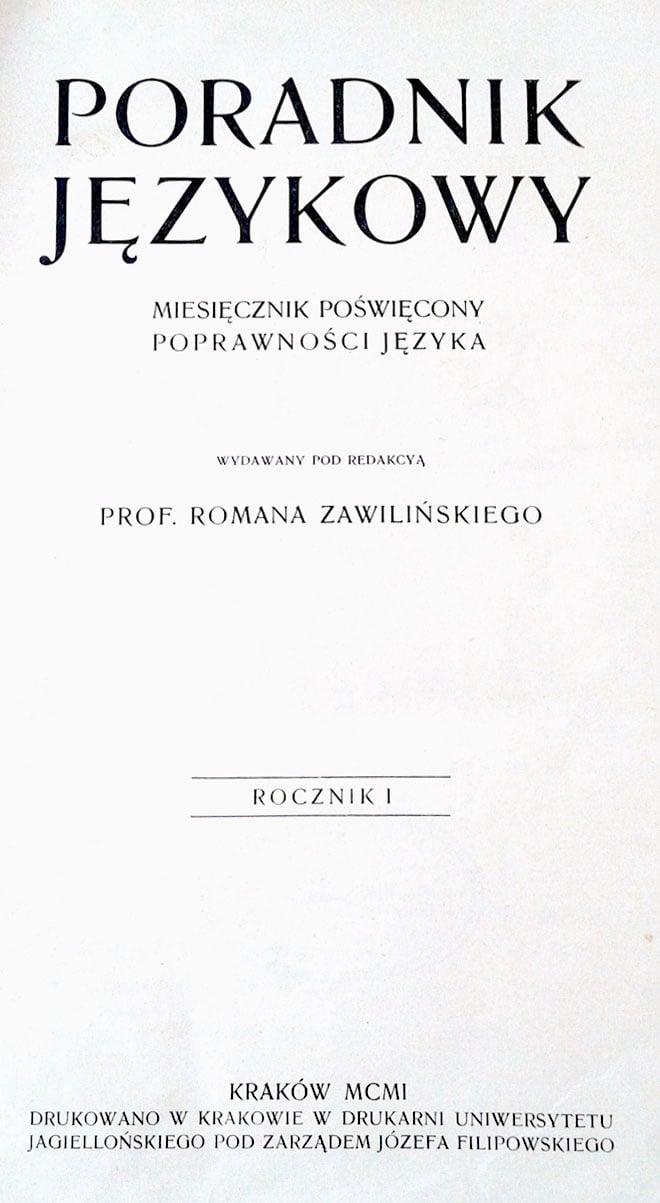II. Poradnik językowy as a section of Język Polski (The Polish Language) (1913–1914, 1916)

From January 1913 on, “Monthly dedicated to issues related to the Polish language” (“Miesięcznik poświęcony sprawom języka polskiego”) was published as Język Polski. This transformation* of Poradnik Językowy into Język Polski is reflected also in the double numbering of the first three annual bound volumes of Język Polski: volumes I–III were treated by the publisher and the editor as annual bound volumes XIII, XIV and XV of Poradnik Językowy. The periodical was published in 1913–1914 by Roman Zawiliński (who was also its responsible editor), in collaboration with professors – which was mentioned on title pages of annual bound volumes – Jan Łoś, Kazimierz Nitsch, Jan Rozwadowski and Mikołaj Rudnicki*.
The name Poradnik językowy (Linguistic guide) was preserved and assigned to the “Queries and replies” section (both names were used interchangeably in annual bound volume I of Język Polski, only “Linguistic guide” in annual bound volume II, and “Queries and replies” in annual bound volume III made up one of the parts of the “Linguistic guide” section). The new formula of the journal was accepted by most of its subscribers. New friends were also won, and the volume of the publication doubled (Język Polski I, 1913, Issue 10, p. 316). The outbreak of the First World War resulted in the suspension of the journal’s publication (for the first time), in 1914, Issues 1–7 were released (printing was completed on 1 July 1914), while Issue 8/10 (a triple one) was released as late as in 1916. In this issue, a sign of discrepancies between Zawiliński and other members of the editorial committee as regards the perception of the periodical’s function can also be noticed:
Within two years, Język Polski has already managed to develop a framework comprising studies on our mother tongue; we have been unable to extend its scope yet but we will be more attentive to and more concerned about Linguistic guide as the practical part of the journal, as we believe that once the Polish school develops throughout the Polish territory, ad hoc advice and guidance will be necessary as much as scholarly explanations and divagations.
Not only was the need to maintain contact with readers emphasised, but it was also believed that
[…] all intelligent Poles should establish – with no separate statutes or associations – a great Society of enthusiasts of our mother tongue and acknowledge our journal as its body; should this be impossible, may at least all schools recognise it as their duty to support the journal whose objective is to work on the history of the mother tongue and trace its development.
The character of the journal evolved towards popularising proper language use (providing linguistic guidance), which is evidenced by: the change of the title from Język Polski (1913, 1914) into Język Polski i Poradnik Językowy (The Polish Language and Linguistic Guide) (1916) and extending the “Linguistic guide” section in the annual bound volume of 1916, which comprised, besides “Queries and replies” and “Miscellaneous” (“Przykład języka służbowo-galicyjskiego” (“An example of the official Galician language”)), also two texts written by priest Filip Golański (“O harmonii mowy polskiej” (“About the harmony of the Polish language”) and “Własność języka” (“Language ownership”)), reprinted from the book: O wymowie i poezji, 2nd edition, Wilno 1788), and R. Zawiliński’s paper (“Nasz język ojczysty” (“Our mother tongue”)).
The cooperation between Zawiliński and the co-editors discontinued at the beginning of 1916. Being unwilling (and unable) to take responsibility for the contents published in the journal, Łoś, Nitsch, Rozwadowski and Rudnicki resigned from their functions in the periodical’s editorial board*. Zawiliński received a letter in this regard on 15 June 1916, following the publication of Issue 5/6. Issues 1–5/6 of 1916 were edited by: Łoś, Nitsch, Rozwadowski, Rudnicki and Zawiliński. The scholars’ opinion was not favourable either for Zawiliński or his vision of Poradnik. Changes in the composition of the editorial board could be allowed for only in Issue 7/10, which was the last one published during the war. The volume of the issue was reduced to 11 author’s sheets (instead of 15–20 as planned). This last issue contained also the information about suspending the publication of the journal for an indefinite period (for the second time) due to a difficult financial situation: increased prices of paper and printing, which were not offset by an increased amount of advance payments, as well as a decreased number of readers, particularly in Congress Poland (Język Polski III, 1916, Issue 7/10, p. 153).
